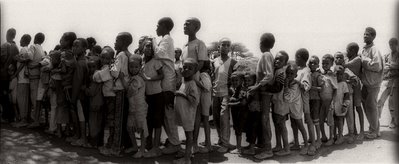Why Ethiopia?
This is the second-most asked question we get. The answer’s pretty simple. Again, the words of Jesus:
"I tell you the truth, whatever you did for one of the least of these brothers of mine, you did for me."
Rhonda and I were teenagers in the 80s. We are from the “We are the World” generation. For those of you who are too young to know what that means (and for those of you who lived in a hole), I’ll explain.

There was a severe drought in Ethiopia in the mid-80s. You almost couldn’t turn on a TV without horrendous sites of small black children starving to death – some of them too weak to even hold their heads up. Anyway, Michael Jackson and Lionel Ritchie (Nichole’s dad) wrote a song called “We Are the World” and recorded it with a bunch of superstars of their day. Proceeds from the sale of what ended up being the #1 song of 1985 went to famine relief.
So for us, Ethiopia was the “least of these”. With a little research we found out that things haven’t improved all that much in Ethiopia. It’s still the 4th poorest country in the world making about $160 per family per year. In addition:
• One in ten children die before their first birthday
• One in six children die before their fifth birthday
• 44% of the population of Ethiopia is under 15 years old
• 60% of children in Ethiopia are stunted because of malnutrition
• The median age in Ethiopia is 17.8 years
• 1.5 million people are infected with AIDS (6th highest in the world)
• 720,000 children have been orphaned by AIDS alone
• Per capita, Ethiopia receives less aid than any country in Africa
• In the 90s the population (3%) grew faster than food production (2.2%)
• Drought struck the country from 2000-2002 (first year no crops, second year no seeds, third year no animals)
• Half the children in Ethiopia will never attend school. 88% will never attend secondary school.
• Coffee prices (Ethiopia’s only major export) fell 40-60% from 1998-2002.
• Ethiopia’s doctor to children ratio is 1 to 24,000.
• In 1993, after 30 long years of war, Eritrea broke from Ethiopia and became an independent nation leaving Ethiopia landlocked without any major seafaring ports.
Sources: Greening Ethiopia, Ethiopia’s Children, Global Income Per Capita, CIA World Facts
Sorry for the history/geography/economics lesson. This is just the tip of the iceberg of what we found. The point is that Ethiopia is still the “least of these.”
Which brings us to the next question we’re often asked. Why siblings?
Brother and sister experience the extreme pain of losing Mom and Dad to some unknown disease. All they’ve got is each other. Wouldn’t it be nice if they could remain together? But often they’re faced with one of two realities:
Separate and be adopted
OR
Remain together and remain unadopted.
We want neither to happen to our children.
Notice my choice of language. “Our” children. These kids are already ours. God has given them to us. Two members of our family are living in Africa right now. We just don’t know their names, genders, ages, or what they look like.
Something pleasantly strange is happening to me. Each day our house feels more and more empty – like there are people missing from our family. Like a family member has left and we’re awaiting their return. It’s a bit bizarre to have these feelings having never met my kids. Is this normal for international adoption parents?



1 Comments:
Just found your blog (from Ethiopian adoption blog) & I'm amazed at how similar our stories are. After reading the question at the end of this entry, I knew I had to comment. My husband & I were saying this whole last paragraph to each other as we flew to Ethiopia about four weeks ago. Now we're home with our two sweet girls & their three older sibs. check out our blog at www.daveandsonya.blogspot.com
Post a Comment
Subscribe to Post Comments [Atom]
<< Home